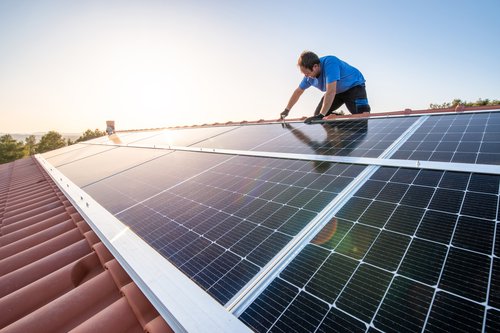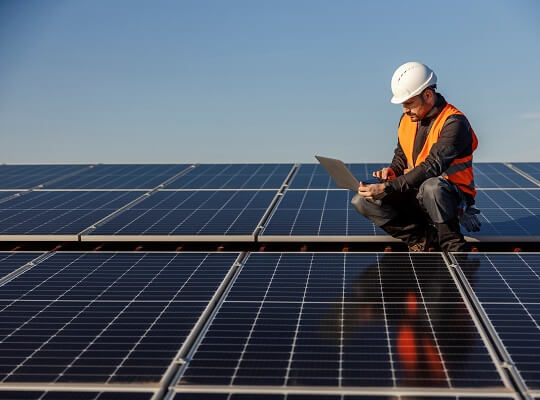The Best Solar Panels for Business: Durable and Economical Power Solutions
The Best Solar Panels for Business: Durable and Economical Power Solutions
Blog Article
How to Pick the Right Solar Power Setup for Your Energy Demands
Choosing a proper solar power installment needs a methodical strategy that begins with a clear understanding of your energy consumption patterns and anticipated future requirements. Factors such as the kind of solar technology, setup expenses, and available incentives play crucial roles in making an educated decision.
Assess Your Power Requirements
Evaluating your energy needs is a vital first action in the solar power installation process. Understanding your current and future power consumption will assist the design of a reliable solar system tailored to your needs.
Think about seasonal variations in energy intake, as certain months may require even more power as a result of home heating or air conditioning demands. Furthermore, evaluate any type of planned modifications in lifestyle or building, such as the acquisition of electrical lorries or home developments, which may raise your power demands in the future.
When you have a detailed understanding of your power intake, you can figure out the ideal solar capacity needed to satisfy those needs. This analysis not only aids in sizing the solar setup however additionally informs choices about power storage options and possible grid connection needs. solar photovoltaic. Inevitably, precisely determining your power requires ensures that your solar energy system operates successfully, supplying the benefits of renewable resource in alignment with your consumption patterns

Evaluate Solar Technology Options
When taking into consideration a solar power installation, it is necessary to evaluate the different solar technology alternatives available to guarantee the system lines up with your energy requirements and spending plan. The key technologies consist of monocrystalline, polycrystalline, and thin-film photovoltaic panels, each offering distinctive advantages and downsides.
Monocrystalline panels are understood for their high efficiency and performance in limited room, making them appropriate for property installations with much less roof covering location. Thin-film solar panels are light-weight and flexible, perfect for unconventional surface areas, yet they generally have reduced performance and call for more area to produce the very same power result.
In addition to panel types, think about solar inverters, which convert the direct present produced by the panels into alternating current for home usage. String inverters, microinverters, and power optimizers each have unique advantages that can impact system efficiency. Assessing these alternatives will certainly help you make an educated choice that satisfies your power requirements successfully.
Consider Installment Prices
Comprehending installation expenses is essential for anyone considering a solar power system. These expenses can differ significantly based on a number of factors, including system dimension, type of panels, and installment intricacy. A common domestic solar setup may vary from $15,000 to $30,000 prior to motivations, which can be a substantial ahead of time investment.
To properly evaluate installment costs, it is vital to acquire comprehensive quotes from numerous solar providers. These quotes need to break down the costs of equipment, labor, permits, and any extra devices required for the setup. Pay close interest to the top quality of products being offered, as higher-quality panels and inverters can cause much better efficiency and long life, potentially balancing out higher first costs.
Furthermore, think about the long-term effects of setup prices. A less expensive setup may save money in advance but could result in greater maintenance prices or reduced power production over time. It is additionally suggested to review financing choices, such as solar fundings or leases, which can affect your general financial commitment.
Research Resident Incentives
Exploring local motivations can significantly affect the overall expense of a solar energy installation. Many areas offer a variety of monetary rewards targeted at promoting renewable resource usage, making solar power much more obtainable and inexpensive for homeowners and companies alike.
These motivations may click here now include government tax obligation credit reports, state refunds, and regional utility company programs that provide cash money rewards or net metering options. As an example, the Federal Investment Tax Credit History (ITC) permits you to deduct a considerable percent of your solar setup prices from your federal tax obligations. State-specific motivations can further web enhance these savings, commonly in the form of straight cash money discounts or tax obligation credits.
Additionally, some city governments may supply real estate tax exemptions for solar installations, making certain that your investment does not raise your residential or commercial property tax obligation obligation. Investigating these motivations can reveal substantial savings, which can influence your choice on the dimension and sort of solar system to set up.

Pick a Trusted Installer
Choosing a trusted installer is essential to making sure the success and longevity of your solar power system. The setup procedure significantly affects the efficiency and performance of your solar panels, making it critical to select a contractor with a proven track record.
Following, verify the installer's qualifications, consisting of licenses, qualifications, and insurance. A respectable installer needs to hold accreditations from recognized organizations, such as the North American Board of Qualified Energy Professionals (NABCEP), showing a high level of expertise. Furthermore, ask about the installer's experience with comparable jobs, specifically in your location, as local environment and policies can influence setup methods.
Request numerous quotes and compare them not just on cost you could check here but likewise on the top quality of equipment and warranties offered. A trustworthy installer should give clear details about their items and services, aiding you make a notified decision. By investing time in choosing a trusted installer, you will certainly enhance the overall performance and sturdiness of your solar energy system.
Conclusion
To conclude, picking the ideal solar energy installment necessitates a comprehensive assessment of energy demands, an understanding of available solar technologies, and a cautious consideration of setup prices. Examining local motivations can boost financial advantages, while picking a respectable installer makes sure high quality workmanship and dependability. solar photovoltaic. By systematically assessing these aspects, people can achieve an optimal solar solution that satisfies both present and future power demands, ultimately adding to lasting energy methods and price savings gradually
Report this page